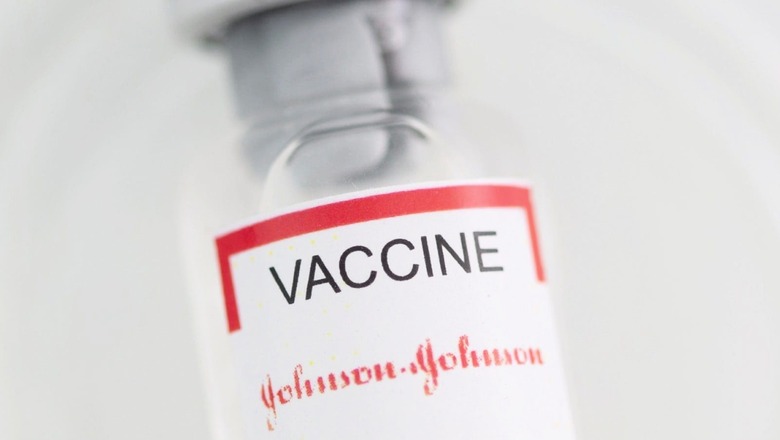
views
Johnson and Johnson or Janssen Pharmaceutica NV’s single-dose COVID-19 vaccine (Ad26.COV2.S) has become the fifth vaccine to receive an emergency use license (EUL) in India on August 7, 2021. J&J vaccine is on a viral-vectored platform (similar to Covishield and Sputnik V). The phase III clinical trials of this vaccine, elegantly named ENSEMBLE study, were conducted with around 43,783 participants, 18 year old and above, in multiple countries. The overall vaccine efficacy of the single-dose vaccine was found to be 66 per cent, ranging from 64 per cent in South Africa and 68 per cent in Brazil to 72 per cent in the US. The efficacy against severe disease is around 85 per cent and the vaccine works against Delta variant as well.
This vaccine is an outcome of the research and development in viral-vectored platform for a decade. The Beth Israel Deaconess Medical Center in Boston, USA, had developed a method for making vaccines out of a virus called Adenovirus 26 (Ad26). J&J had independently used Ad26 to develop vaccines for Ebola and other diseases. With emergence of SARS-CoV-2 in January 2020, J&J and Beth Israel researchers collaborated for development of a COVID-19 vaccine. The US was the first country to give EUL to this vaccine on February 27,2021 and since then it has received regulatory approval from the UK, the European Medical Agency (EMA), is included in the WHO emergency use listing and is being administered in nearly 60 countries across the world.
J&J vaccine uses the AdVac platform—which uses genetically modified Adenovirus—which has been used to develop the Ebola vaccine approved by the European Commission. There are investigational Zika, RSV (Respiratory Syncytial Virus) and HIV vaccines under development. J&J has collaborated with Biological E. Limited in India to produce the this vaccine. However, timeline for starting the production and the cost per dose for the vaccine is yet to be announced.
The single-dose vaccine can be stored at 2°C to 8°C for up to six months and at 9°C to 25°C for up to 12 hours. The opened vial can be stored at 2°C to 8°C for up to 6 hours or at room temperature for up to 2 hours. J&J is also conducting trials for a two-dose vaccine regime, the results of which are expected in late August or early September 2021. The company is also testing the vaccine for pregnant women as well as children.
ALSO READ | Covishield, Covaxin, J&J: The Science Behind Different Vaccines and How They Work
The adverse event profile for this vaccine is very similar to other COVID-19 vaccines. However, as with other viral-vectored vaccines, J&J vaccine has been found to be associated with increased risk of a rare adverse event called thrombosis with thrombocytopenia syndrome (TTS). This is a rare syndrome where the immune system mistakenly starts attacking blood cells which are needed for clotting. This condition is more common in adult women of less than 50 years of age.
This rate is more common in European settings than among Asians. Experts believe that the difference in the rate of TTS could be linked to the population profile and ethnicity in which the vaccines have been administered. A review of all available data at this time shows that the J&J/Janssen COVID-19 vaccine’s known and potential benefits outweigh its known and any risk. In early August 2021, EMA advised that vaccine vials need to carry the warning of rare side effects of tinnitus and dizziness.
How India Can Optimize Benefits of J&J vaccine
India needs immediate and urgent supply of more vaccine doses; therefore, any additional approval of a COVID-19 vaccine is a welcome step. However, it needs to be remembered that licensing does not mean immediate vaccine availability. Sputnik V, for instance, was given EUL in India on April 13; however, its administration could start only around 10 weeks later. Moderna vaccine was given EUL on June 29 and there is still no clarity when the vaccine would be available in India. This also shows that India needs to focus on reducing the licensing-to-delivery gap.
Both Moderna and J&J have asked for removal of indemnity clause to market vaccines in India, an issue on which the Indian government is yet to decide and that is one of the policy bottlenecks.
J&J is the first and only single-shot COVID-19 vaccine in India. As India is struggling to administer at least one vaccine dose to the eligible population, a single-shot vaccine will have a distinct advantage in achieving high coverage and accelerate India’s progress towards its December vaccination targets. However, experts believe that it would require a booster shot, but it is not clear when.
ALSO READ | EXPLAINED: As J&J Gets Emergency Nod In India, Here’s What You Need To Know About The One-Shot Vax
Another benefit of this vaccine is its relative stability at room temperature, which can facilitate its deployment in difficult to access areas and for population where repeat access to services could be challenging. In those settings, J&J could be a vaccine of choice.
It Can Help Tackle Vaccine Inequity
J&J single-dose COVID-19 vaccine has the potential to accelerate India’s vaccination drive. However, licensing is only one of the first steps to ensure its availability. There is an urgent need for the Indian government to make a decision on the indemnity clause. A single-dose vaccine could be shot in the arm for India, especially in difficult-to-access areas. It can help tackle vaccine inequities, which is a major concern regarding the ongoing drive in India.
Dr Chandrakant Lahariya (MBBS, MD), Physician-Epidemiologist, is India’s leading expert on COVID-19 disease and vaccines. He is the lead co-author of ‘Till We Win: India’s Fight Against The COVID-19 Pandemic’. He can be reached at [email protected] or @DrLahariya. The views expressed in this article are those of the author and do not represent the stand of this publication.
Read all the Latest News, Breaking News and Coronavirus News here.




















Comments
0 comment